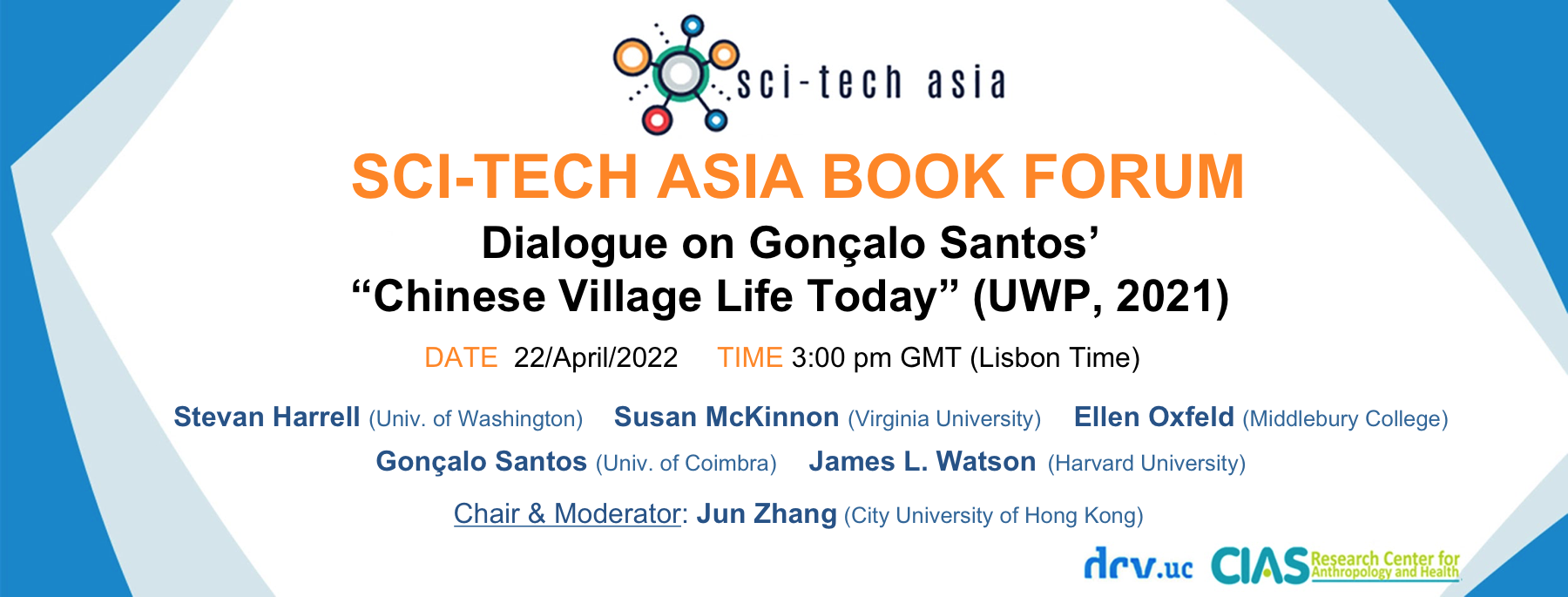Sci-Tech Asia Webinar
Sci-Tech Asia Book Forum: Dialogue on Gonçalo Santos’ “Chinese Village Life Today” (UWP, 2021)

Webinar Description
Join us for a discussion on the recent book by anthropologist Gonçalo Santos entitled “Chinese Village Life Today: Building Families in an Age of Transition” (UWP, 2021)
When Chinese anthropologist Xiaotong Fei first published Peasant Life in China in 1939, the title of the book was meant to capture the rustic, earthbound orientation of Chinese civilization. Today, the title of Fei’s book no longer does justice to a society largely dominated by urban development and urban lifeways, but a significant portion of China’s population still lives in rural areas. Many rural residents are traveling regularly to the city to gain better access to jobs, health care, and consumer goods, and this cyclic transit and engagement with new urban discourses, technologies, and medical practices is transforming village life. In Chinese Village Life Today, anthropologist Gonçalo Santos analyzes many of these transformations drawing on more than two decades of field research in one rural township in Guangdong Province, north of the industrialized Pearl River Delta region. Santos considers the intimate choices of village families in the face of larger forces of modernization, showing how these negotiations shaped the configuration of daily village life, from marriage to family planning, from childbirth to childcare, from public sanitation to popular religion. Filled with vivid anecdotes and keen observations, this book presents a fresh perspective on China’s urban-rural divide and the remaking of China’s countryside in an age of increasingly technocratic far-reaching interventions in the conduct of everyday life. What new forms of sociality are emerging in rural China in this age of technocratic transition? Are we witnessing the end of village life, or a radical reconfiguration of rural spaces and rural-urban ties? What is the place of the countryside in the future of China?
Speaker
 Stevan Harrell (University of Washington)
Stevan Harrell (University of Washington)
Stevan Harrell is an ethnographer and interdisciplinary environmental researcher, specializing in Taiwan, China, and the Pacific Northwest of North America. His current projects are Development and its Discontents: An Ecological History of Modern China, and Rhododendrons Blooming: The Rise and Fall of Yangjuan Primary School. He hopes to write books on the history of agriculture in Whatcom County and on the Nooksack River.
 Susan McKinnon (Virginia University)
Susan McKinnon (Virginia University)
Susan McKinnon is Professor Emerita in the Department of Anthropology, University of Virginia. Her research has focused on kinship, marriage, gender, hierarchy, and histories of science and medicine. Her books include From a Shattered Sun: Hierarchy, Gender, and Alliance in the Tanimbar Islands (1991), Neo-liberal Genetics: The Myths and Moral Tales of Evolutionary Psychology (2005), and the co-edited volumes Relative Values: Reconfiguring Kinship Studies (2001) and Vital Relations: Modernity and the Persistent Life of Kinship (2013). She is currently working on a book about the conceptual linkages between differential forms of marriage, political governance, and nation.
 Ellen Oxfeld (Middlebury College)
Ellen Oxfeld (Middlebury College)
Ellen Oxfeld is a professor of anthropology at Middlebury College. She is the author of a recent ethnography of food culture in rural southeastern China entitled Bitter and Sweet: Food, Meaning and Modernity in Rural China (2017). Other works include “Drink Water, but Remember the Source”: Moral Discourse in a Chinese Village (2010), and Blood, Sweat and Mahjong: Family and Enterprise in an Overseas Chinese Community (1993). She is currently working on a new project exploring meanings of commensality in contemporary rural China.
 Gonçalo Santos (University of Coimbra) — Author
Gonçalo Santos (University of Coimbra) — Author
Gonçalo Santos is an anthropologist and STS scholar, specializing in China and in the study of the history of anthropology. He is currently an auxiliary professor of socio-cultural anthropology in the Department of Life Sciences, and a Researcher and Group Coordinator in the Research Center for Anthropology and Health (CIAS), at the University of Coimbra. He is the author of Chinese Village Life Today (2021) and the co-editor of Transforming Patriarchy (2017). He is the founder and the director of the international research network Sci-Tech Asia.
 James L. Watson (Harvard University)
James L. Watson (Harvard University)
James L. Watson is Fairbank Professor of Chinese Society and Professor of Anthropology Emeritus at Harvard University. Watson also taught at the University of London (School of Oriental and African Studies), University of Hawaii, and the University of Pittsburgh. His research focuses on Chinese emigration, ancestor worship and popular religion, family life and village organization, food systems, and the emergence of a post-socialist culture in the People’s Republic of China.
 Jun Zhang (City University of Hong Kong) — Chair and Moderator
Jun Zhang (City University of Hong Kong) — Chair and Moderator
Jun Zhang is an assistant professor at City University of Hong Kong. She had held positions at Bryn Mawr College and the University of Hong Kong. Her works explore social transformation through urban governance, material culture and infrastructure, space and mobility, and class politics, with a regional focus on China. She is the author of Driving toward Modernity: Cars and the Lives of the Middle Class in Contemporary China (2019). In her on-going projects, Zhang takes the spatial metamorphosis of Canton/Guangzhou to understand the socio-economic and political transformations in China in the Republican era and in the contemporary.
Previous Episodes
Sci-Tech Asia Webinar Series
Our Webinar series features scholars from all over the world sharing their on-going research on topics at the intersection between science, technology, and society (STS) in the 21st century. Our virtual seminars are hosted via Zoom and live-streamed via our social media.
